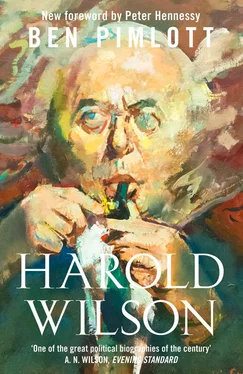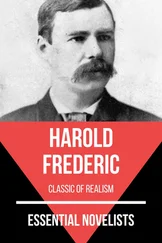Soon after his return to England, Harold sat for a County Minor Scholarship, the eleven-plus of its day. Along with four other members of his class he was successful, and in September 1927, proudly clad in brown blazer with pale blue piping round the collar, he entered Royds Hall Secondary School in Huddersfield.
2
BE PREPARED
‘Ambition’ is a grand word with which to dignify the fantasies of childhood, even when they are later realized. Childish thoughts about the future are multifarious, and kaleidoscopic. We should not take too seriously the Downing Street photo, the declarations to parents or long-suffering teachers. Harold was not actively interested in politics until a much later age than many of his future parliamentary colleagues. Yet it is not unusual to say of somebody ‘he wanted to be a doctor’ (or a priest, or a soldier) ever since he was a child. What is so strange, therefore, about an idée fixe of a political kind?
The Wilson family story (as related to Leslie Smith, Harold’s first ‘official’ biographer) describes a Damascus Road experience which took place in the summer of 1928 after both the Downing Street photo and the voyage to Australia. The Wilsons had travelled to Scotland on holiday, and visited Stirling. Here Herbert took Harold to see the statue of Sir Henry Campbell-Bannerman, Liberal Prime Minister in 1905–8 and former MP for the town. Beneath the effigy, Herbert told his son about the 1906 Liberal landslide, the growth of the Labour Party, the radical history of the Colne Valley, and the careers of Mann, Grayson and Snowden.
The effect, wrote Smith, was dramatic: politics became the only career Harold wanted to pursue. Henceforth, he felt ‘an inner certainty of destiny, an absolute conviction about his future mission and his unique fitness to undertake it’. At first (according to Smith), the only doubt in the boy’s mind was what position he was aiming at: sometimes it was Foreign Secretary, more often it was Chancellor of the Exchequer. But soon he had raised his sights. When he and his friends talked about careers, ‘Harold’s contribution was confined to the simple observation: “I should like to be Prime Minister”.’ 1No doubt there is a post hoc element to this tale. Others, however, confirm that Harold began to talk about a political future for himself early on. Harold Ainley maintains that he was not surprised to hear that his friend had entered Parliament in 1945. ‘He always said he was going to be an MP.’ 2A Roydsian contemporary who subsequently worked as a journalist on a local paper, fifty years later recalled Harold, aged fifteen, saying, ‘One day I might be Prime Minister.’ 3
Such an idea was not quite so fanciful for a schoolboy in Huddersfield as it might have been elsewhere. In addition to Snowden, there was Asquith, a weaver’s son. A short Historical Note in the 1927 edition of the Huddersfield Official Guide ends with the information: ‘At what is now the Huddersfield College, New North Road, the Earl of Oxford and Asquith, then known as H. H. Asquith, received his early education, he being a nephew of a former most distinguished townsman and freeman of the Borough, the late J. E. Williams, J.P., LL.D.’ 4Asquith died in 1928, the year of Harold’s Damascus Road. A. V. Alexander, a leading Labour MP, addressed a gathering of Roydsians, shortly after this event, which Huddersfield took particularly to heart, and declared patronizingly: ‘Perhaps one of these boys will one day be Prime Minister.’ Such platitudes fed Harold’s imagination. Later he recalled thinking: ‘Didn’t he know?’5
People have often held such statements against Wilson, though generally on contradictory grounds. On the one hand, while acknowledging that he was exceptionally ambitious within a profession in which driving ambition is the norm, they have felt that such an objective in a child must be regarded as insufferably conceited and therefore unacceptable as an explanation. On the other, they have seen it as evidence of political shallowness – a sign that he calculated his path to office, with little interest in the purpose of getting there.
Yet it is naïve to imagine that the majority of politicians drift into Parliament. For most, long-term preparation and strategizing has been a necessity, however much they might offer alternative accounts in their memoirs. Many a student politician has dreamt of Cabinet office. In this, only the dating of Wilson’s ambition, and its lofty focus, is unusual. We should not regard the formation of such a scheme – whether to impress teachers and friends, or to earn the approval of indulgent parents, or for whatever reason – as disreputable. Neither should we consider it unbelievable.
Harold enjoyed Royds Hall, a new, mixed grammar school, opened in 1921. He threw himself into the many activities which it offered. Yet for all his cheerful energy he remained, as in the Scouts, lonely in a crowd – as if locked into a secret world, which did not fully connect with the public one. He took part in teams, but he was not a team player. Although, according to Ainley, he never showed much interest in courting girls, 6he was happier in their company. Later he reflected that the girls at the school ‘fulfilled a kind of mission civilisatrice’ on the boys. 7He was still in touch with one Royds Hall girl, Olga Gledhill, who lived in Blackpool after her marriage, when he was Prime Minister. There was also a class mistress, Helen Whelan, who liked and guided him: chiding him gently for his conceits, but also nurturing him as a talented pupil, who responded to female encouragement. It was for Miss Whelan that Harold wrote an essay, in 1928, on ‘Myself in 25 Years’ about introducing his first Budget as Chancellor of the Exchequer. When Harold gained distinctions at Oxford, she was one of the first people he told.
As at New Street Council School, there was an exhibitionist flavour to his performance. He soon discovered the school magazine. Articles poured from his pen – wit was his forte. An indifferent thirteen-year-old singer, he published a jocular ‘Diary of a Choir Boy’, which concluded:
February 12th Choir is warned of approach of speech day. Boys are advised to begin scrubbing the visible parts of their anatomy … February 19th First layer of dirt begins to show signs of dispersing. Choir practice last period, during which Miss Whelan and many first trebles nearly collapse as a result of the aforementioned first trebles singing ‘Hark, Hark, the Lark’ without going flat. The entire choir dances the hornpipe on hearing there will be no after-school practice. J. H. Wilson, 3B.
He was also an actor. When he took part in She Stoops to Conquer , girls from a neighbouring school gave him a glowing review. ‘Tony Lumpkin (H. Wilson) is worthy of first mention since he is the soul of the play,’ they wrote. ‘He took his part with gusto, in fact overacting in places, for he diverted the attention of the audience from the other proceedings. He was very amusing in his relations with his mother and Miss Neville (Olga Gledhill).’ His tendency to overact and thrust himself forward, in the classroom as well as on the stage, did not please all the teachers at Royds Hall, some of whom remembered him, many years later, as a tiresome prig. According to Leslie Smith (who generally put the most favourable interpretation on the observations of witnesses), ‘several of them found his manner and outlook excessively precocious.’ Harold apparently failed to notice, ‘and never realized that his attitude to them, to his work, and to his professed future career, was sometimes interpreted as an attempt either to impress or to curry favour’.
He was not, however, an academic prodigy. At first his place in class was some way from the top, and his early school reports criticized him for idleness. He was good at languages, and according to one teacher, ‘displayed more than a passing interest in Esperanto’. Eventually he headed his class, but he was never thought to be outstanding. 8Perhaps, under different circumstances, he would have excelled at Royds Hall, and made his mark upon the school. The opportunity, however, was denied him by two almost simultaneous traumas.
Читать дальше











